Organizational history
With the deepening of the Great Depression in 1930, the Communist International (Comintern) based in Moscow began to see millions of unemployed workers around the world as a fertile field for the sowing of revolutionary ideas. Directives were issued to the member parties of the Comintern instructing that efforts be made for the organization of the unemployed and to attempt to build a mass movement around the demand for unemployment insurance. [1]

The Great Depression was a severe worldwide economic depression that took place mostly during the 1930s, beginning in the United States. The timing of the Great Depression varied across nations; in most countries it started in 1929 and lasted until the late-1930s. It was the longest, deepest, and most widespread depression of the 20th century. In the 21st century, the Great Depression is commonly used as an example of how intensely the world's economy can decline.

The Communist International (Comintern), known also as the Third International (1919–1943), was an international organization that advocated world communism. The Comintern resolved at its Second Congress to "struggle by all available means, including armed force, for the overthrow of the international bourgeoisie and the creation of an international Soviet republic as a transition stage to the complete abolition of the state". The Comintern had been preceded by the 1916 dissolution of the Second International.

Moscow is the capital and most populous city of Russia, with 13.2 million residents within the city limits, 17 million within the urban area and 20 million within the metropolitan area. Moscow is one of Russia's federal cities.
To this end, the decision was made to form a new auxiliary of the Communist Party USA was established to direct the unemployment insurance campaign. On November 11, 1930, representatives of a number of the Communist Party's so-called "mass organizations" (pejoratively known as "front groups") were assembled at a conference held in New York City to establish a new organization known as the National Campaign Committee for Unemployment Insurance. [1] Among those party organizations represented at this gathering were the Communist Party's Unemployed Councils, its newly established fraternal organization the International Workers Order, and the party's radical trade union organization, the Trade Union Unity League. [1]
A Communist front organization is an organization identified as a front organization under the effective control of a Communist party, the Communist International or other Communist organizations. They attracted politicized individuals who were not party members but who often followed the party line and were called fellow travellers.

The City of New York, usually called either New York City (NYC) or simply New York (NY), is the most populous city in the United States. With an estimated 2017 population of 8,622,698 distributed over a land area of about 302.6 square miles (784 km2), New York is also the most densely populated major city in the United States. Located at the southern tip of the state of New York, the city is the center of the New York metropolitan area, the largest metropolitan area in the world by urban landmass and one of the world's most populous megacities, with an estimated 20,320,876 people in its 2017 Metropolitan Statistical Area and 23,876,155 residents in its Combined Statistical Area. A global power city, New York City has been described as the cultural, financial, and media capital of the world, and exerts a significant impact upon commerce, entertainment, research, technology, education, politics, tourism, art, fashion, and sports. The city's fast pace has inspired the term New York minute. Home to the headquarters of the United Nations, New York is an important center for international diplomacy.

The Unemployed Councils of the USA (UC) was a mass organization of the Communist Party, USA established in 1930 in an effort to organize and mobilize unemployed workers to advance party policy goals in preparation for an anticipated final conflict to overthrow capitalism.
The gathering determined to launch a petition drive aimed at bringing the signatures of at least 1 million Americans to Congress in an effort to force the adoption of a program of unemployment insurance in the United States. [1] Veteran Communist Party functionary Alfred Wagenknecht was placed in charge of the campaign. [1]
On February 10, 1931, the fruits of the NCCUI's efforts, petitions said to contain some 1.4 million signatures, were brought to Washington, DC by a group of 140 of the organization's active supporters, headed by Wagenknecht. [1] The United States Capitol Police were called out in force in anticipation of the arrival of the Communists. [1]

The United States Capitol Police (USCP) is a federal law enforcement agency charged with protecting the United States Congress within the District of Columbia and throughout the United States and its territories. The USCP is the only full service federal law enforcement agency responsible to the legislative branch of the U.S. government.
Three members of the NCCUI were ultimately expelled from the gallery of the U.S. Senate for interrupting debate. [1] After presenting their petitions the group quietly departed the capitol on the next day, with Wagenknecht declaring, "Next time we will not come with signatures. We will come with organized mass power." [2]
The U.S. House of Representatives took up the matter of Communism in America during its floor debate on February 11 with conservatives opining the desirability of deporting alien radicals from America, while progressives such as Rep. Fiorello LaGuardia of New York declaring that Congress should indeed pass some sort of unemployment insurance legislation as a way of undercutting revolutionary sentiment. [3]

The Communist Party of New Zealand (CPNZ) was a Communist political party in New Zealand which existed from March 1921 until the early 1990s. Although spurred to life by events in Soviet Russia in the aftermath of World War I, the party had roots in pre-existing revolutionary socialist and syndicalist organisations, including in particular the independent Wellington Socialist Party, supporters of the Industrial Workers of the World in the Auckland region, and a network of impossiblist study groups of miners on the west coast of the South Island.
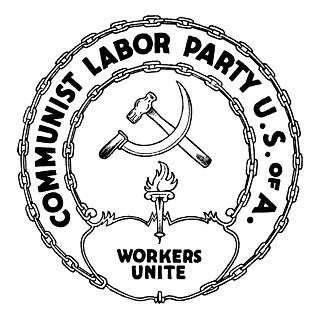
The Communist Labor Party of America (CLPA) was one of the organizational predecessors of the Communist Party USA.

Earl Russell Browder was an American political activist and leader of the Communist Party USA (CPUSA). Browder is best remembered as the General Secretary of the CPUSA during the 1930s and first half of the 1940s.
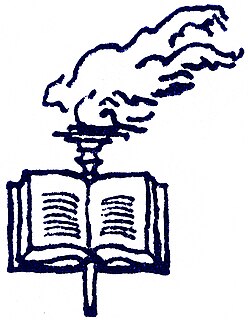
The Proletarian Party of America (PPA) was a small communist political party in the United States, originating in 1920 and terminated in 1971. Originally an offshoot of the Communist Party of America, the group maintained an independent existence for over five decades. It is best remembered for carrying forward Charles H. Kerr & Co., the oldest publisher of Marxist books in America.
Harvey Elliott Klehr is a professor of politics and history at Emory University. Klehr is known for his books on the subject of the American Communist movement, and on Soviet espionage in America.
John Earl Haynes is an American historian who worked as a specialist in 20th-century political history in the Manuscript Division of the Library of Congress. He is known for his books on the subject of the American Communist and anti-Communist movements, and on Soviet espionage in America.
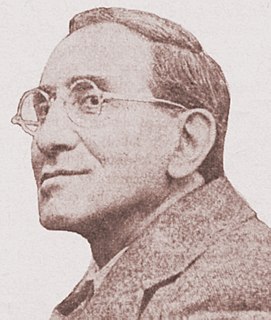
Israel Amter (1881–1954) was a Marxist politician and founding member of the Communist Party USA (CPUSA). Amter is best remembered as one of the Communist Party leaders jailed in conjunction with the International Unemployment Day riot of 1930 and as a frequent candidate for public office, including three runs for Governor of New York.
The Pan-Pacific Trade Union Secretariat (PPTUS) was a regional subdivision of the Red International of Labor Unions, the trade union organization associated with the Communist International. Established in Hankow, China in May 1927, the PPTUS attempted to coordinate communist activity in the organized labor movement of China and the Pacific basin, including particularly Japan, Korea, Indonesia, the Philippines, Australia, and the United States.
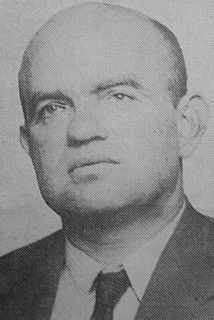
Joseph Zack Kornfeder (1898–1963), also known as Joseph Zack and to his friends as "Joe," was an Austro-Hungarian-born American who was a founding member and top leader of the Communist Party of America in 1919. Zack was a Representative of the Communist International to South America from 1930 to 1931, before quitting the Communist Party in 1934.

The 1922 Bridgman Convention was a secret conclave of the underground Communist Party of America (CPA) held in August 1922 near the small town of Bridgman, Michigan, about 90 miles (140 km) outside of the city of Chicago on the banks of Lake Michigan. The convention, called by the CPA as its annual gathering for the election of officers and making of internal decisions, was attended by a delegate who was secretly an employee of the Bureau of Investigation, who informed his superiors of the date and general location of the gathering. The convention was raided by local and federal law enforcement authorities on August 22, 1922, and a number of participants and a large quantity of documents seized in an operation which garnered national headlines. Two 1923 test trials of the Michigan criminal syndicalism law resulted from the arrests, with trade union leader William Z. Foster freed by a "hung jury," while Communist Party leader C. E. Ruthenberg was convicted. Ruthenberg ultimately died of peritonitis in 1927, just after his appeals were exhausted and just before sentence was enforced. No additional trials associated with the 1922 Bridgman raid were conducted.
Clarence A. "Charlie" Hathaway (1892–1963) was an activist in the Minnesota trade union movement and a prominent leader of the Communist Party of the United States from the 1920s through the early 1940s. He is best remembered as the party's leading organizer of the Federated Farmer-Labor Party in 1923 and 1924, as the editor of The Daily Worker (1933–1940), and as a longtime member of the Communist Party's governing Central Committee.

The 2nd World Congress of the Comintern was a gathering of approximately 220 voting and non-voting representatives of Communist and revolutionary socialist political parties from around the world, held in Petrograd and Moscow from July 19 to August 7, 1920. The 2nd Congress is best remembered for formulating and implementing the 21 Conditions for membership in the Communist International.
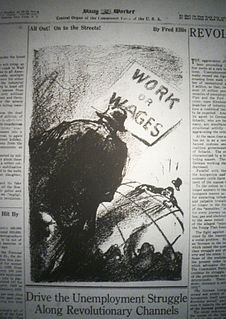
International Unemployment Day was a coordinated international campaign of marches and demonstrations, marked by hundreds of thousands of people in major cities around the world taking to the streets to protest mass unemployment associated with the Great Depression. The Unemployment Day marches, organized by the Communist International and coordinated by its various member parties, resulted in two deaths of protestors in Berlin, injuries at events in Vienna and the Basque city of Bilbao, and less violent outcomes in London and Sydney.
The Washington Commonwealth Federation (WCF) was a political pressure group established in the American state of Washington in 1934 as "Commonwealth Builders, Incorporated" (CBI). The organization changed its name to Washington Commonwealth Federation in 1935. The organization did not run political candidates in its own name but rather functioned as an organized faction in the Washington State Democratic Party.
The International Labor Defense (ILD) (1925–1947) was a legal advocacy organization established in 1925 in the United States as the American section of the Comintern's International Red Aid network. The ILD defended Sacco and Vanzetti, was active in the anti-lynching, movements for civil rights, and prominently participated in the defense and legal appeals in the cause célèbre of the Scottsboro Boys in the early 1930s. Its work contributed to the appeal of the Communist Party among African Americans in the South. In addition to fundraising for defense and assisting in defense strategies, from January 1926 it published Labor Defender, a monthly illustrated magazine that achieved wide circulation. In 1946 the ILD was merged with the National Federation for Constitutional Liberties to form the Civil Rights Congress, which served as the new legal defense organization of the Communist Party USA. It intended to expand its appeal, especially to African Americans in the South. In several prominent cases in which blacks had been sentenced to death in the South, the CRC campaigned on behalf of black defendants. It had some conflict with former allies, such as the NAACP, and became increasingly isolated. Because of federal government pressure against organizations it considered subversive, such as the CRC, it became less useful in representing defendants in criminal justice cases. The CRC was dissolved in 1956. At the same time, in this period, black leaders were expanding the activities and reach of the Civil Rights Movement. In 1954, in a case managed by the NAACP, the US Supreme Court ruled in Brown v. Board of Education that segregation of public schools was unconstitutional.
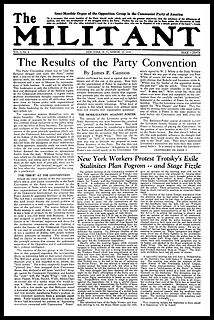
The Communist League of America (Opposition) was founded by James P. Cannon, Max Shachtman and Martin Abern late in 1928 after their expulsion from the Communist Party USA for Trotskyism. The CLA(O) was the United States section of Leon Trotsky's International Left Opposition and initially positioned itself as not a rival party to the CPUSA but as a faction of it and the Comintern. The group was terminated in 1934 when it merged with the American Workers Party headed by A. J. Muste to establish the Workers Party of the United States.
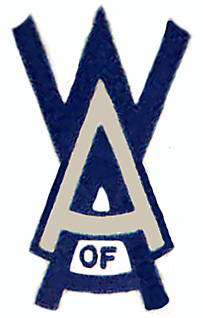
The Workers Alliance of America (WAA) was a Popular Front era political organization established in March 1935 in the United States which united several efforts to mobilize unemployed workers under a single banner. Founded by the Socialist Party of America (SPA), the Workers Alliance was later joined by the Unemployed Councils of the USA, a mass organization of the Communist Party USA (CPUSA), and by the National Unemployed Leagues originating with A.J. Muste's Conference for Progressive Labor Action (CPLA) and successor organizations.


















